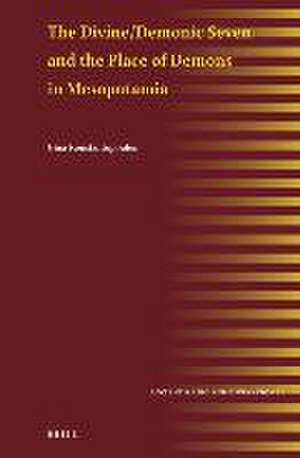The Divine/Demonic Seven and the Place of Demons in Mesopotamia: Ancient Magic and Divination, cartea 20
Autor Gina Konstantopoulosen Limba Engleză Hardback – 14 iun 2023
The Sebettu appeared both as fierce, threatening demons and as divine, protective, figures. These seemingly contradictory qualities worked together, as their martial ferocity facilitated their religious and political role. When used in royal inscriptions, they became fierce warriors attacking the king’s enemies, retaining that demonic nature. This flexibility was not unique to the Sebettu, and this study thus provides a lens through which to examine the place of demons in Mesopotamia as a whole.
Din seria Ancient Magic and Divination
- 18%
 Preț: 1526.83 lei
Preț: 1526.83 lei - 18%
 Preț: 1548.88 lei
Preț: 1548.88 lei - 18%
 Preț: 758.56 lei
Preț: 758.56 lei - 18%
 Preț: 940.84 lei
Preț: 940.84 lei - 18%
 Preț: 1508.75 lei
Preț: 1508.75 lei - 18%
 Preț: 894.61 lei
Preț: 894.61 lei - 18%
 Preț: 1492.19 lei
Preț: 1492.19 lei - 18%
 Preț: 1151.34 lei
Preț: 1151.34 lei - 5%
 Preț: 943.97 lei
Preț: 943.97 lei - 18%
 Preț: 745.93 lei
Preț: 745.93 lei - 18%
 Preț: 995.09 lei
Preț: 995.09 lei - 18%
 Preț: 1435.37 lei
Preț: 1435.37 lei - 18%
 Preț: 1450.77 lei
Preț: 1450.77 lei - 18%
 Preț: 1736.52 lei
Preț: 1736.52 lei - 18%
 Preț: 1853.86 lei
Preț: 1853.86 lei - 18%
 Preț: 792.79 lei
Preț: 792.79 lei - 18%
 Preț: 1543.66 lei
Preț: 1543.66 lei - 18%
 Preț: 1187.03 lei
Preț: 1187.03 lei - 18%
 Preț: 1080.09 lei
Preț: 1080.09 lei - 18%
 Preț: 881.45 lei
Preț: 881.45 lei
Preț: 936.60 lei
Preț vechi: 1142.20 lei
-18% Nou
Puncte Express: 1405
Preț estimativ în valută:
179.24€ • 186.44$ • 147.97£
179.24€ • 186.44$ • 147.97£
Carte disponibilă
Livrare economică 22 martie-05 aprilie
Preluare comenzi: 021 569.72.76
Specificații
ISBN-13: 9789004546141
ISBN-10: 9004546146
Dimensiuni: 155 x 235 mm
Greutate: 0.66 kg
Editura: Brill
Colecția Brill
Seria Ancient Magic and Divination
ISBN-10: 9004546146
Dimensiuni: 155 x 235 mm
Greutate: 0.66 kg
Editura: Brill
Colecția Brill
Seria Ancient Magic and Divination
Notă biografică
Gina Konstantopoulos, Ph.D. (2015), University of Michigan, is an Assistant Professor in Assyriology and Cuneiform Studies at the University of California Los Angeles. She has published on magic, religion, and literature in Mesopotamia.
Cuprins
Acknowledgments
List of Figures and Tables
Abbreviations
List of Appendices
Frequently Cited Texts and Their Editions
Introduction
Terminology and Defining the Demonic
Previous Studies and Writing the Sebettu
Seven as a Number of Significance
Overview of the Book
1 The Variable Nature of Demons
1 The Mostly Malevolent Udug
2 The Ambiguous Alad
3 The Benevolent Lamma
2 Early Foundations of Literary Evidence and Cultic Use
1 Third Millennium References
2 The Sumerian Narrative of Gilgameš and Huwawa
3 Lugalbanda in the Wilderness: The Torches of Inana
4 The Malevolent Sebettu in Old Babylonian Incantations
5 The Hymn to Hendursaĝa
6 Literary Tropes and the Subservience of Demons
7 Second Millennium Cultic Evidence
3 The Escalated Use of the Sebettu in the First Millennium
1 First Millennium Literary Texts
2 Expansionist Politics: The Initial Stages of the Assyrian Empire
3 Initial Decline
4 Returning to Strength
5 The Last Great Kings of Assyria
6 Ritual and Cultic Connections
4 The Sebettu in Incantations and Household Use
1 The Sebettu in Incantations
2 The Sebettu and the Udug Hul Incantation Series
3 Malevolence and Benevolence: A Survey of the Incantations as a Whole
5 Iconography and the Pleiades
1 The Behavior of the Pleiades
2 Astral Imagery and the Pleiades
3 Iconography and Representations of the Sebettu
4 Seals and the Pleiades
Conclusion: Concerning Demons
Appendix A: Comparative Epithets of the Sebettu
Appendix B: Birds, Deities, and Cries in the Birdcall Text
Appendix C: Textual Attestations to the Sebettu
Appendix D: Star Maps
Appendix E: Catalogue of Cylinder Seals
Works Cited
Index
List of Figures and Tables
Abbreviations
List of Appendices
Frequently Cited Texts and Their Editions
Introduction
Terminology and Defining the Demonic
Previous Studies and Writing the Sebettu
Seven as a Number of Significance
Overview of the Book
1 The Variable Nature of Demons
1 The Mostly Malevolent Udug
2 The Ambiguous Alad
3 The Benevolent Lamma
2 Early Foundations of Literary Evidence and Cultic Use
1 Third Millennium References
2 The Sumerian Narrative of Gilgameš and Huwawa
3 Lugalbanda in the Wilderness: The Torches of Inana
4 The Malevolent Sebettu in Old Babylonian Incantations
5 The Hymn to Hendursaĝa
6 Literary Tropes and the Subservience of Demons
7 Second Millennium Cultic Evidence
3 The Escalated Use of the Sebettu in the First Millennium
1 First Millennium Literary Texts
2 Expansionist Politics: The Initial Stages of the Assyrian Empire
3 Initial Decline
4 Returning to Strength
5 The Last Great Kings of Assyria
6 Ritual and Cultic Connections
4 The Sebettu in Incantations and Household Use
1 The Sebettu in Incantations
2 The Sebettu and the Udug Hul Incantation Series
3 Malevolence and Benevolence: A Survey of the Incantations as a Whole
5 Iconography and the Pleiades
1 The Behavior of the Pleiades
2 Astral Imagery and the Pleiades
3 Iconography and Representations of the Sebettu
4 Seals and the Pleiades
Conclusion: Concerning Demons
Appendix A: Comparative Epithets of the Sebettu
Appendix B: Birds, Deities, and Cries in the Birdcall Text
Appendix C: Textual Attestations to the Sebettu
Appendix D: Star Maps
Appendix E: Catalogue of Cylinder Seals
Works Cited
Index
